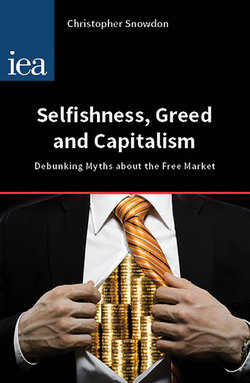Читать книгу Selfishness, Greed and Capitalism - Christopher Snowdon - Страница 12
На сайте Литреса книга снята с продажи.
Conclusion
ОглавлениеEconomists do not assume that greed is good, nor do they assume that people are wholly selfish. Like everybody else, they know that people are capable of a range of thoughts, feelings, motivations and emotions. The important point is that the free market works regardless of whether people are selfish or altruistic. But if one rejects self-interest as the key motivation that drives the economy, it is a short step to concluding that people do things because … well, because they just do. Without the profit motive as an explanation, we have to imagine that those who work hard do so because they enjoy working, not because of the surplus income they earn. And if people do not respond to financial incentives in a rational or predictable way, there can be little disincentive effect from raising taxes. Hence Richard Murphy can assert that ‘entrepreneurial activity is a lifestyle choice that genuine entrepreneurs take irrespective of taxes’ (Murphy 2011: 283) while Joseph Stiglitz can endorse any income tax level up to and including 100 per cent, saying ‘I can agree with Laffer5 that if you tax people at 100 per cent they might not work, but even then you have plenty of people who are not motivated by money’ (Smith 2012).
Chang’s message – and the title of the chapter in which he takes on Adam Smith – is ‘assume the worst about people and you get the worst’, but this is an empty cliché. Assumptions have little impact on how people behave, it is how you treat them that counts. The irony is that Chang does not assume the best about people. Like many left-wingers, he emphasises mankind’s benevolent and compassionate nature while supporting policies which suggest that society will descend into chaos and degradation unless the government regulates almost every conceivable activity and transaction. He does not expect to get the best out of bankers and chief executives by assuming the best about them. Instead he supports bans on various financial services and limits on executive pay. Chang does not recommend that the government step aside and allow people’s ‘non-selfish behaviours’ and ‘moral codes’ to flourish (Chang 2010: 50). On the contrary, he concludes that ‘government needs to become bigger and more active’ (260).
Supporters of a free market, on the other hand, are caricatured as having a bleak view of mankind while espousing policies that emphasise voluntary co-operation with minimal restraints on human behaviour. This circle can only be squared if we understand that they do not, in fact, believe that people are heartless, self-serving agents. The only group of intellectuals who consistently claim that we are self-serving, consumerism-obsessed materialists are left-wing thinkers such as Oliver James, who rails against ‘selfish capitalists’. As Kenneth Minogue (1989: 23–24) observed, it is the egalitarian who believes that ‘most people are selfish and greedy, but that governments can act morally on their behalf’.
Simply put, economists assume that people are largely driven by self-interest when it comes to financial transactions. This is not an article of faith, rather it is an observation based on the revealed preferences of real people in every society since time immemorial. As Binmore (2007: 4–5) notes, empirical research
only supports the conclusion that for most adequately incentified people in most economic environments in developed societies, the data can be explained without assuming that such an other-regarding component is large. [In any case] it is not axiomatic in mainstream economics that human beings maximise their own income [and economists – neoliberal or otherwise – do not believe that] people have no other-regarding or social component at all in the utility functions that describe their final choices.
No matter how narrowly we define it, self-interest is clearly a very powerful motivation in human interactions. Towards the end of his chapter on self-interest, Chang acknowledges this, saying, ‘Of course, all this is not to deny that self-seeking is one of the most important human motivations’ (Chang 2010: 50). It explains why the baker sold bread in the eighteenth century and it continues to explain the bulk of economic behaviour much better than theories based on ‘benevolence’ or ‘lifestyle choices’. However, nobody seriously suggests that it is mankind’s only impetus. Altruism, charity and generosity flourish in everyday life and can still be found even in the hard-nosed world of business. As Chang rightly says, ‘Self-interest is a most powerful trait in most human beings. However, it’s not our only drive’ (41). That is the simple truth. No free-market economist has ever said otherwise. On this point, at least, there is no disagreement.
Greed is not good and capitalism does not rely on people being greedy. Capitalism is good, however, because it works even when people are greedy.
5 Arthur Laffer is best known for the ‘Laffer Curve’, which shows that tax revenues decline when tax rates are set too high.
